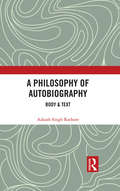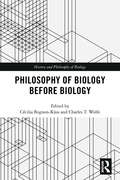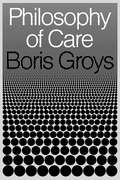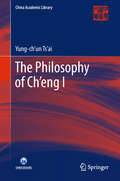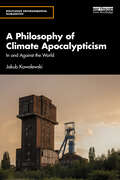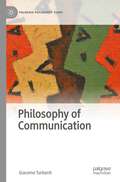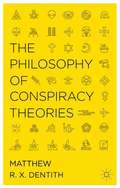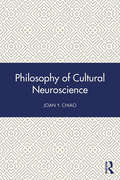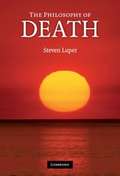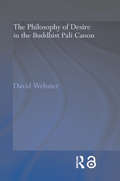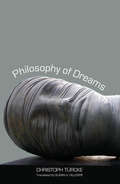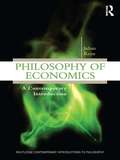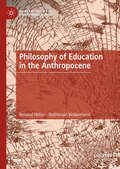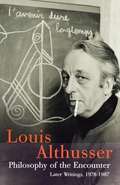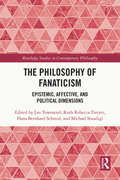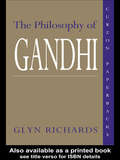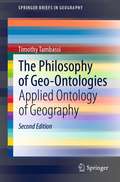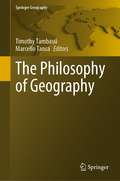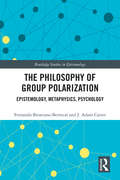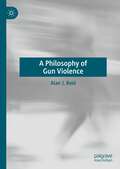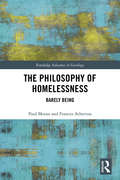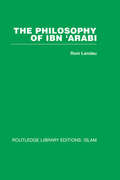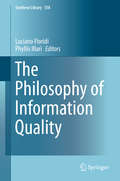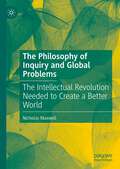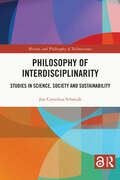- Table View
- List View
A Philosophy of Autobiography: Body & Text
by Aakash Singh RathoreThis book offers intimate readings of a diverse range of global autobiographical literature with an emphasis on the (re)presentation of the physical body. The twelve texts discussed here include philosophical autobiography (Nietzsche), autobiographies of self-experimentation (Gandhi, Mishima, Warhol), literary autobiography (Hemingway, Das) as well as other genres of autobiography, including the graphic novel (Spiegelman, Satrapi), as also documentations of tragedy and injustice and subsequent spiritual overcoming (Ambedkar, Pawar, Angelou, Wiesel). In exploring different literary forms and orientations of the autobiographies, the work remains constantly attuned to the physical body, a focus generally absent from literary criticism and philosophy or study of leading historical personages, with the exception of patches within phenomenological philosophy and feminism. The book delves into how the authors treated here deal with the flesh through their autobiographical writing and in what way they embody the essential relationship between flesh, spirit and word. It analyses some seminal texts such as Ecce Homo, The Story of My Experiments with Truth, Waiting for a Visa, I Know Why the Caged Bird Sings, A Moveable Feast, Night, Baluta, My Story, Sun and Steel, The Philosophy of Andy Warhol, MAUS and Persepolis. Lucid, bold and authoritative, this book will be of great interest to scholars and researchers of philosophy, literature, gender studies, political philosophy, media and popular culture, social exclusion, and race and discrimination studies.
Philosophy of Biology Before Biology (History and Philosophy of Biology)
by Cécilia Bognon-Küss Charles T. WolfeThe use of the term "biology" to refer to a unified science of life emerged around 1800 (most prominently by scientists such as Lamarck and Treviranus, although scholarship has indicated its usage at least 30-40 years earlier). The interplay between philosophy and natural science has also accompanied the constitution of biology as a science. Philosophy of Biology Before Biology examines biological and protobiological writings from the mid-eighteenth century to the early nineteenth century (from Buffon to Cuvier; Kant to Oken; and Kielmeyer) with two major sets of questions in mind: What were the distinctive conceptual features of the move toward biology as a science? What were the relations and differences between the "philosophical" focus on the nature of living entities, and the "scientific" focus? This insightful volume produces a fresh but also systematic perspective both on the history of biology as a science and on the early versions of, in the 1960s in a post-positivist context, the philosophy of biology. It will appeal to students and researchers interested in fields such as history of science, philosophy of science and biology.
Philosophy of Care
by Boris GroysRetracing the philosophical discussions around careOur current culture is dominated by the ideology of creativity. One is supposed to create the new and not to care about the things as they are. This ideology legitimises the domination of the &“creative class&” over the rest of the population that is predominantly occupied by forms of care – medical care, child care, agriculture, industrial maintenance and so on. We have a responsibility to care for our own bodies, but here again our culture tends to thematize the bodies of desire and to ignore the bodies of care – ill bodies in need of self-care and social care.But the discussion of care has a long philosophical tradition. The book retraces some episodes of this tradition - beginning with Plato and ending with Alexander Bogdanov through Hegel, Heidegger, Bataille and many others. The central question discussed is: who should be the subject of care? Should I care for myself or trust the others, the system, the institutions? Here, the concept of the self-care becomes a revolutionary principle that confronts the individual with the dominating mechanisms of control.
The Philosophy of Ch’eng I (China Academic Library)
by Yung-Ch’un Ts’aiThis book offers a comprehensive account of the great Neo-Confucian Master Cheng I (1033-1107), showing his philosophical ideas in a modern light. It systematically examines Cheng’s extensive literature and provides an ingenious interpretation of Cheng’s social and political views. The author, Yung-ch’un Ts’ai, was a respected scholar of sociology and theology in 20th century China.
A Philosophy of Climate Apocalypticism: In and Against the World (Routledge Environmental Humanities)
by Jakub KowalewskiThis book offers a long-overdue analysis of the ubiquity of eco-apocalypticism in current discourses on the climate crisis.Drawing on a wide range of sources and theoretical traditions from ecological works and radical pamphlets, through political theology and continental philosophy to ancient and medieval apocalypses, the book sheds a comprehensive light on the concepts, processes, and experiences which circulate around the figure of the environmental end of the world. Importantly, this book argues that apocalypticism can provide a productive philosophical framework for addressing the climate catastrophe, enabling us to propose a distinctive answer to the fundamental question which haunts progressive ecological projects: how can we defend the world we find indefensible?Appealing to students, academics, and researchers in philosophy, political theology, and environmental humanities, this book is a timely intervention which hopes to demonstrate that, when all else fails, it is the end of the world which may save the planet.
Philosophy of Communication (Palgrave Philosophy Today)
by Giacomo TurbantiBy comprehensively exploring the theoretical questions raised by professional communication, this book provides an introduction to the philosophy of communication. Key Features:Arranged in three parts encompassing the theory of communication, conflict transformation and the role communication plays within organizations. Examines how agreement is reached through communication, how such agreement is negotiated between different perspectives and how such negotiation produces our organizations. Includes a full range of pedagogical features, including study questions, essay questions. chapter summaries, focus points and suggestions for further reading. Philosophy of Communication is essential reading for all students of the philosophy of communication.
The Philosophy Of Conspiracy Theories
by Matthew R. X. DentithConspiracy theories are a popular topic of conversation in everyday life but are often frowned upon in academic discussions. Looking at the recent spate of philosophical interest in conspiracy theories, The Philosophy of Conspiracy Theories looks at whether the assumption that belief in conspiracy theories is typically irrational is well founded
Philosophy of Cultural Neuroscience
by Joan Y. ChiaoThe goal of this volume is to highlight theoretical and methodological advances in cultural neuroscience and the implications of theoretical and empirical advances in cultural neuroscience for philosophy. The study of cultural and biological factors that contribute to human behavior has been an important inquiry for centuries, and recent advances in the field of cultural neuroscience allow for novel insights into how cultural and biological factors shape mind, brain and behavior. Theoretical and empirical advances in cultural neuroscience, which investigate the origins of culture, may shed light on philosophical issues of the mind and science.
The Philosophy Of Death
by Steven LuperThe Philosophy of Death is a discussion of the basic philosophical issues concerning death, and a critical introduction to the relevant contemporary philosophical literature. Luper begins by addressing questions about those who die: What is it to be alive? What does it mean for you and me to exist? Under what conditions do we persist over time, and when do we perish? Next, he considers several questions concerning death, including: What does dying consist in; in particular, how does it differ from ageing? Must death be permanent? By what signs may it be identified? Is death bad for the one who dies? If so why? Finally he discusses whether, and why, killing is morally objectionable, and suggests that it is often permissible; in particular, (assisted) suicide, euthanasia and abortion may all be morally permissible. His book is a lively and engaging philosophical treatment of a perennially fascinating and relevant subject.
The Philosophy of Desire in the Buddhist Pali Canon (Routledge Critical Studies in Buddhism)
by David WebsterDavid Webster explores the notion of desire as found in the Buddhist Pali Canon. Beginning by addressing the idea of a 'paradox of desire', whereby we must desire to end desire, the varieties of desire that are articulated in the Pali texts are examined. A range of views of desire, as found in Western thought, are presented as well as Hindu and Jain approaches. An exploration of the concept of ditthi(view or opinion) is also provided, exploring the way in which 'holding views' can be seen as analogous to the process of desiring. Other subjects investigated include the mind-body relationship, the range of Pali terms for desire, and desire's positive spiritual value. A comparative exploration of the various approaches completes the work.
Philosophy of Dreams
by Christoph Turcke Susan H. GillespieWhy has humankind developed so differently from other animals? How and why did language, culture, religion, and the arts come into being? In this wide-ranging and ambitious essay, Christoph Türcke offers a new answer to these timeworn questions by scrutinizing the phenomenon of the dream, using it as a psychic fossil connecting us with our Stone Age ancestors. Provocatively, he argues that both civilization and mental processes are the results of a compulsion to repeat early traumas, one to which hallucination, imagination, mind, spirit, and God all developed in response. Until the beginning of the modern era, repetition was synonymous with de-escalation and calming down. Then, automatic machinery gave rise to a new type of repetition, whose effects are permanent alarm and distraction. The new global forces of distraction, Türcke argues, are producing a specific kind of stress that breaks down the barriers between dreams and waking consciousness. Türcke’s essay ends with a sobering indictment of this psychic deregulation and the social and economic deregulations that have accompanied it.
Philosophy of Economics: A Contemporary Introduction (Routledge Contemporary Introductions to Philosophy)
by Julian ReissPhilosophy of Economics: A Contemporary Introduction is the first systematic textbook in the philosophy of economics. It introduces the epistemological, metaphysical and ethical problems that arise in economics, and presents detailed discussions of the solutions that have been offered. Throughout, philosophical issues are illustrated by and analysed in the context of concrete cases drawn from contemporary economics, the history of economic ideas, and actual economic events. This demonstrates the relevance of philosophy of economics both for the science of economics and for the economy. This text will provide an excellent introduction to the philosophy of economics for students and interested general readers alike.
Philosophy of Education in the Anthropocene (Palgrave Studies in Educational Futures)
by Renaud Hétier Nathanaël WallenhorstThis book develops a philosophy of education for the Anthropocene, proposing that we think about education in the light of contemporary bioclimatic challenges. Education is seen as the political means of choice for containing the runaway Earth system change and ensuring the sustainability of human life in society. In this book, Hétier and Wallenhorst continue their work on the biogeophysical and socio-political analysis of the Anthropocene here, tracing the path toward the re-founding of a political education to prepare students to address the greatest challenge of our time: the gradual disappearance of the bioclimatic conditions necessary for our very existence.
Philosophy Of The Encounter: Later Writings, 1978-1987
by Louis Althusser Francois Matheron Oliver Corpet G. M. GoshgarianIn the late 1970s and 1980s, Louis Althusser endured a period of intense mental instability during which he murdered his wife and was committed to a psychiatric hospital. Spanning this deeply troubling period, this fourth and final volume of political and philosophical writings reveals Althusser wrestling in a creative and unorthodox fashion with a whole series of theoretical problems to produce some of his very finest work. In his profound exploration of questions of determinism and contingency, Althusser developed a "philosophy of the encounter," which he links to a hidden and subterranean tradition in the history of Western thought which stretches from Epicurus through Spinoza and Machiavelli to Marx, Derrida and Heidegger.
The Philosophy of Fanaticism: Epistemic, Affective, and Political Dimensions (Routledge Studies in Contemporary Philosophy)
by Leo TownsendThe essays in this volume explore some of the disconcerting realities of fanaticism, by analyzing its unique dynamics, and considering how it can be productively confronted. The book features both analytic and continental philosophical approaches to fanaticism. Working at the intersections of epistemology, philosophy of emotions, political philosophy, and philosophy of religion, the contributors address a range of questions related to this increasingly relevant, yet widely neglected topic. What are the distinctive features of fanaticism? What are its causes, motivations, and reasons? In what ways, if at all, is fanaticism epistemically, ethically, and politically problematic? And how can fanaticism be combatted or curtailed? The Philosophy of Fanaticism will be of interest to scholars and advanced students working in epistemology, philosophy of religion, philosophy of emotions, moral psychology, and political philosophy.
The Philosophy of Gandhi: A Study of his Basic Ideas
by Glyn RichardsThis book seeks to give a coherent account of Gandhi's basic ideas, demonstrating the importance of Hindu thought and the centrality of his concept of Truth.
The Philosophy of Geo-Ontologies: Applied Ontology of Geography (SpringerBriefs in Geography)
by Timothy TambassiPlaced at the intersection among philosophy, geography, and computer science, the domain of investigation of applied ontology of geography ranges from making explicit assumptions and commitments of geography as a discipline, to the theoretical and technical needs of geographical/IT tools, such as GIS and geo-ontologies. Such a domain of investigation represents the central topic of discussion of this book, which intends: 1) to provide an overview of the mutual interactions among the disciplines encompassed in the domain; 2) to discuss notions such as spatial representation, boundaries, and geographical entities that constitute the main focus of the (philosophical) ontology of geography; 3) to propose a geographical classification of geo-ontologies in response to their increasing diffusion within the contemporary debate, as well as to show what ontological categories best systematize their contents. The second edition of the book differs from the first one as it offers a broader analysis of the (philosophical) ontology of geography: an analysis that is no more limited to the theoretical need of geo-ontologies.
The Philosophy of Geography (Springer Geography)
by Timothy Tambassi Marcello TancaThe relationship between geography and philosophy is still largely in need of being explored. Geographers and philosophers share the responsibility for that. On the one hand, geographers have considered as a dangerous deviation any attempt to elaborate an image of the Earth which was not a mere replica of a cartographic representation. On the other hand, philosophers have generally been uninterested in a discipline offering little chance for critical reflection. In light of these considerations, the purpose of this book is to identify some fundamental philosophical issues involved in the reflection of geography by adopting a perspective which looks at the discipline with a specific focus on its fundamental concepts and distinctions.
The Philosophy of Group Polarization: Epistemology, Metaphysics, Psychology (Routledge Studies in Epistemology)
by Fernando Broncano-Berrocal J. Adam CarterGroup polarization—the tendency of groups to incline toward more extreme positions than initially held by their individual members—has been rigorously studied by social psychologists, though in a way that has overlooked important philosophical questions. This is the first book-length treatment of group polarization from a philosophical perspective. The phenomenon of group polarization raises several important metaphysical and epistemological questions. From a metaphysical point of view, can group polarization, understood as an epistemic feature of a group, be reduced to epistemic features of its individual members? Relatedly, from an epistemological point of view, is group polarization best understood as a kind of cognitive bias or rather in terms of intellectual vice? This book compares four models that combine potential answers to the metaphysical and epistemological questions. The models considered are: group polarization as (i) a collective bias; (ii) a summation of individual epistemic vices; (iii) a summation of individual biases; and (iv) a collective epistemic vice. Ultimately, the authors defend a collective vice model of group polarization over the competing alternatives. The Philosophy of Group Polarization will be of interest to students and researchers working in epistemology, particularly those working on social epistemology, collective epistemology, social ontology, virtue epistemology, and distributed cognition. It will also be of interest to those working on issues in political epistemology, applied epistemology, and on topics at the intersection of epistemology and ethics.
A Philosophy of Gun Violence
by Alan J. ReidThis book uses a philosophy of technology to demonstrate that guns are predisposed for an intentional use, making them inherently non-neutral artifacts. This argument rejects the often-cited value neutral thesis and instrumentalist view that “guns don’t kill people; people kill people”, and instead, explains the lethality of the gun through the lenses of affordance theory, behavioral design, and choice architecture. Ultimately, this book proposes an ethical and value-sensitive model for gun reform, which embodies the perspective of French philosopher Bruno Latour, who said, “You are different with a gun in your hand; the gun is different with you holding it.”
The Philosophy of Homelessness: Barely Being (Routledge Advances in Sociology)
by Paul Moran Frances AthertonThe Philosophy of Homelessness is borne out of a five-year ethnographic research project involving being with a group of chronically homeless people in Chester. A small city located in the northwest of the UK, Chester is economically supported by its heritage and the tourism that this attracts. In an obvious sense, the awkwardness of the phrase ‘being with a group of chronically homeless people’ is regrettable. Nevertheless, this unfortunately self-conscious phrase is significant, with its importance residing in the word and concept of ‘being’. Whilst philosophical understandings of being are often thought about in rather abstract terms, The Philosophy of Homelessness explores the daily experience of chronic homelessness from a perspective that renders its ontological impress in ways that are explicitly felt, often in forms that are overtly political and exclusionary in character, especially in terms of identity and belonging within the city. Themes that emerge from the work, which coalesce around living in the margins of the city and experiencing only the shadow of the right to be, include: the economy of chronic addiction and its impact upon the body; the relationship between chronic homelessness and the law; and chronic homelessness and identity and desire. These themes are explored through a number of thinkers, though predominantly: Nietzsche, Lacan, Bourdieu and Kristeva. This work is likely to be of interest to anyone working in the fields of: criminology; sociology, especially those areas concerned with marginalised groups; and philosophy in its socially and politically engaged forms; as well as to those with an interest in homelessness.
The Philosophy of Ibn 'Arabi
by Rom LandauOriginally published 1959. Ibn ‘Arabi is one of the most significant thinkers of Islam. Yet he is far less widely known in the Western world than Ibn Sina, Al-Ghazali, Ibn Rushd or even Al Farabi. This volume provides original interpretations and illustrations to some of Ibn ‘Arabi’s ideas, as well as including a number of his texts in English.
The Philosophy of Information Quality (Synthese Library #358)
by Luciano Floridi Phyllis IllariThis work fulfills the need for a conceptual and technical framework to improve understanding of Information Quality (IQ) and Information Quality standards. The meaning and practical implementation of IQ are addressed, as it is relevant to any field where there is a need to handle data and issues such as accessibility, accuracy, completeness, currency, integrity, reliability, timeliness, usability, the role of metrics and so forth are all a part of Information Quality.In order to support the cross-fertilization of theory and practice, the latest research is presented in this book. The perspectives of experts from beyond the origins of IQ in computer science are included: library and information science practitioners and academics, philosophers of information, of engineering and technology, and of science are all contributors to this volume.The chapters in this volume are based on the work of a collaborative research project involving the Arts and Humanities Research Council and Google and led by Professor Luciano Floridi, University of Oxford.This work will be of interest to anyone handling data, including those from commercial, public, governmental and academic organizations. The expert editors’ contributions introduce issues of interest to scientists, database curators and philosophers, even though the issues may be disguised in the language and examples common to a different discipline.
The Philosophy of Inquiry and Global Problems: The Intellectual Revolution Needed to Create a Better World
by Nicholas MaxwellUniversities have long been dominated by a philosophy of inquiry that may be called knowledge-inquiry. This holds that, in order to do justice to the basic humanitarian aim of helping to promote human welfare, academic inquiry must, in the first instance, seek knowledge and technological know-how. First, knowledge is to be acquired; once acquired, it can be applied to help promote human welfare. But this philosophy of knowledge-inquiry is an intellectual and humanitarian disaster. It violates three of the four most elementary rules of rational problem solving conceivable, and as a result fails to give priority to the task of helping humanity resolve those conflicts and problems of living, such as the climate and nature crises, that need to be resolved if we are to make progress to a better world – a world in which there is peace, democracy, justice, liberty, and sustainable prosperity, for all. Very few academics today are aware of this rationality scandal. We urgently need to bring about a revolution in universities around the world, wherever possible, so that academic inquiry puts all four rules of rational problem solving into practice, and becomes rationally devoted to helping humanity learn how to make progress towards a better world. Knowledge-inquiry needs to become wisdom-inquiry, rationally devoted to helping humanity create a wiser world.
Philosophy of Interdisciplinarity: Studies in Science, Society and Sustainability (History and Philosophy of Technoscience)
by Jan Cornelius SchmidtInterdisciplinarity is a hallmark of contemporary knowledge production. This book introduces a Philosophy of Interdisciplinarity at the intersection of science, society and sustainability. In light of the ambivalence of the technosciences and the challenge of sustainable development in the Anthropocene, this engaged philosophy provides a novel critical perspective on interdisciplinarity in science policy and research practice. It draws upon the original spirit of interdisciplinarity as an environmentalist concept and advocates an essential change in human-nature relations. The author utilizes the rich tradition of philosophy for case study analysis and develops a framework to disentangle the various forms of inter- and transdisciplinarity. Philosophy of Interdisciplinarity offers a foundation for a critical-reflexive program of interdisciplinarity conducive to a sustainable future for our knowledge society and contributes to fields such as sustainability sciences, social ecology, environmental ethics, technology assessment, complex systems, philosophy of nature, and philosophy of science. It injects a fresh way of thinking on interdisciplinarity – and supports researchers as well as science policy makers, university managers, and academic administrators in critical-reflexive knowledge production for sustainable development.
